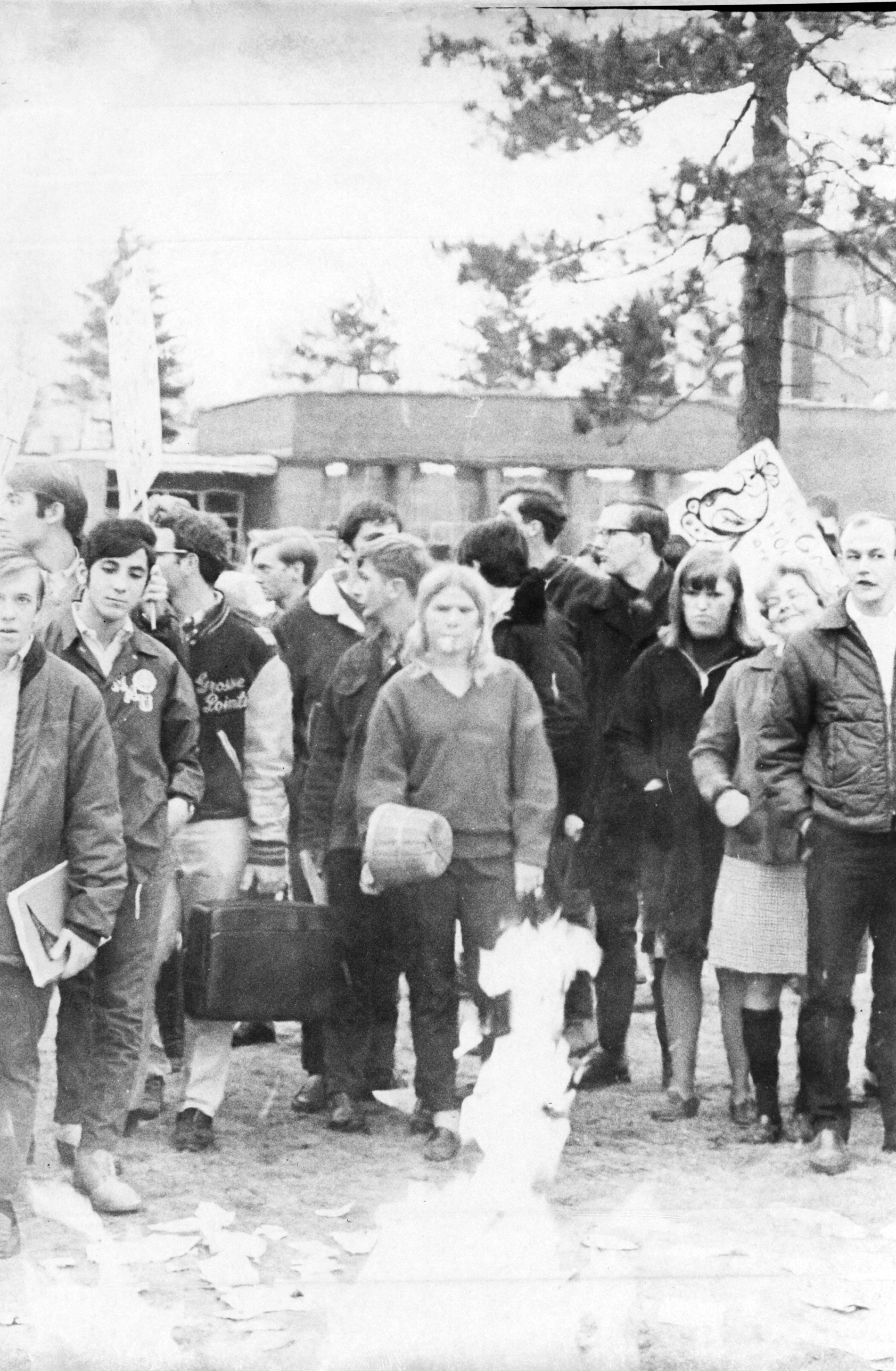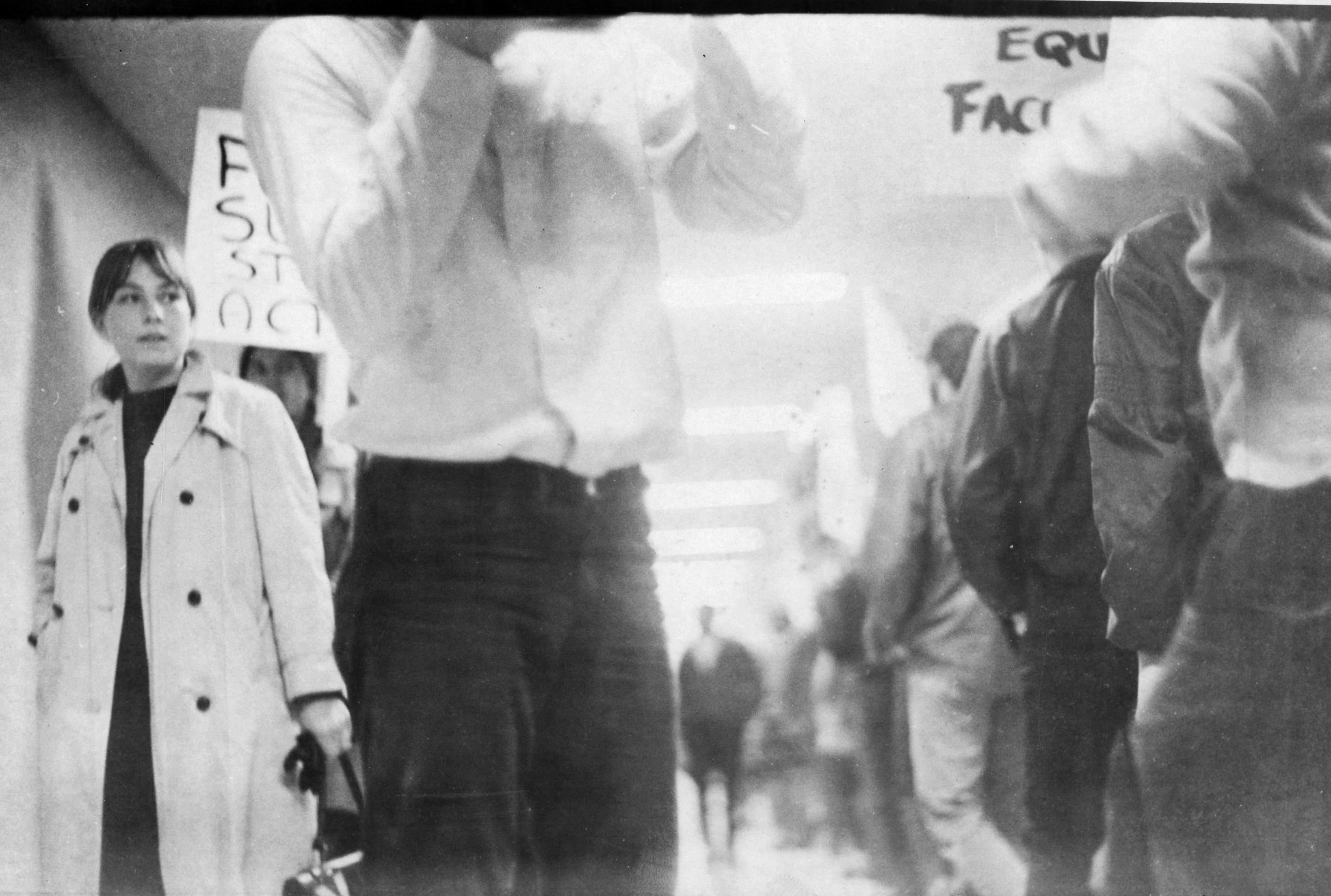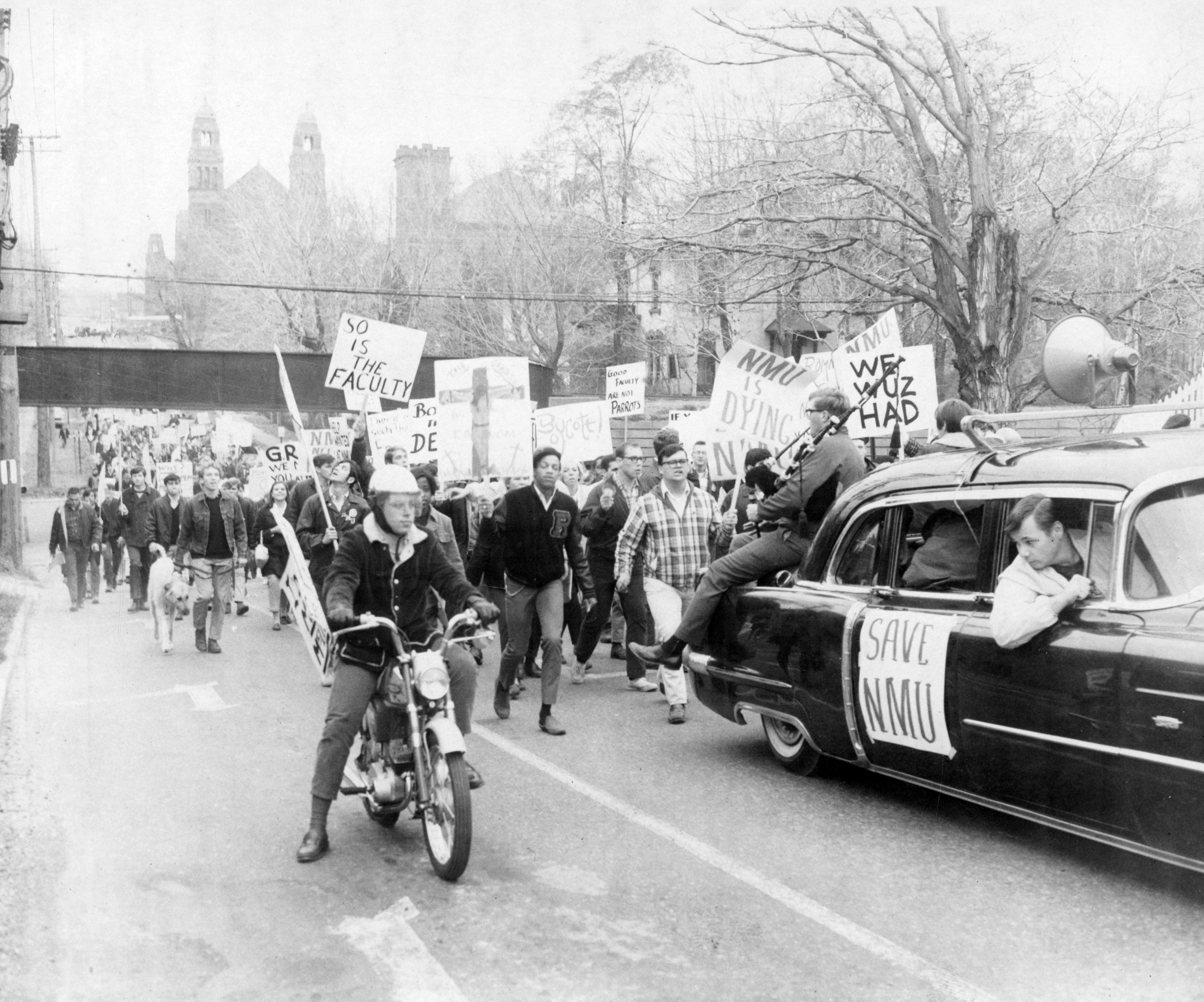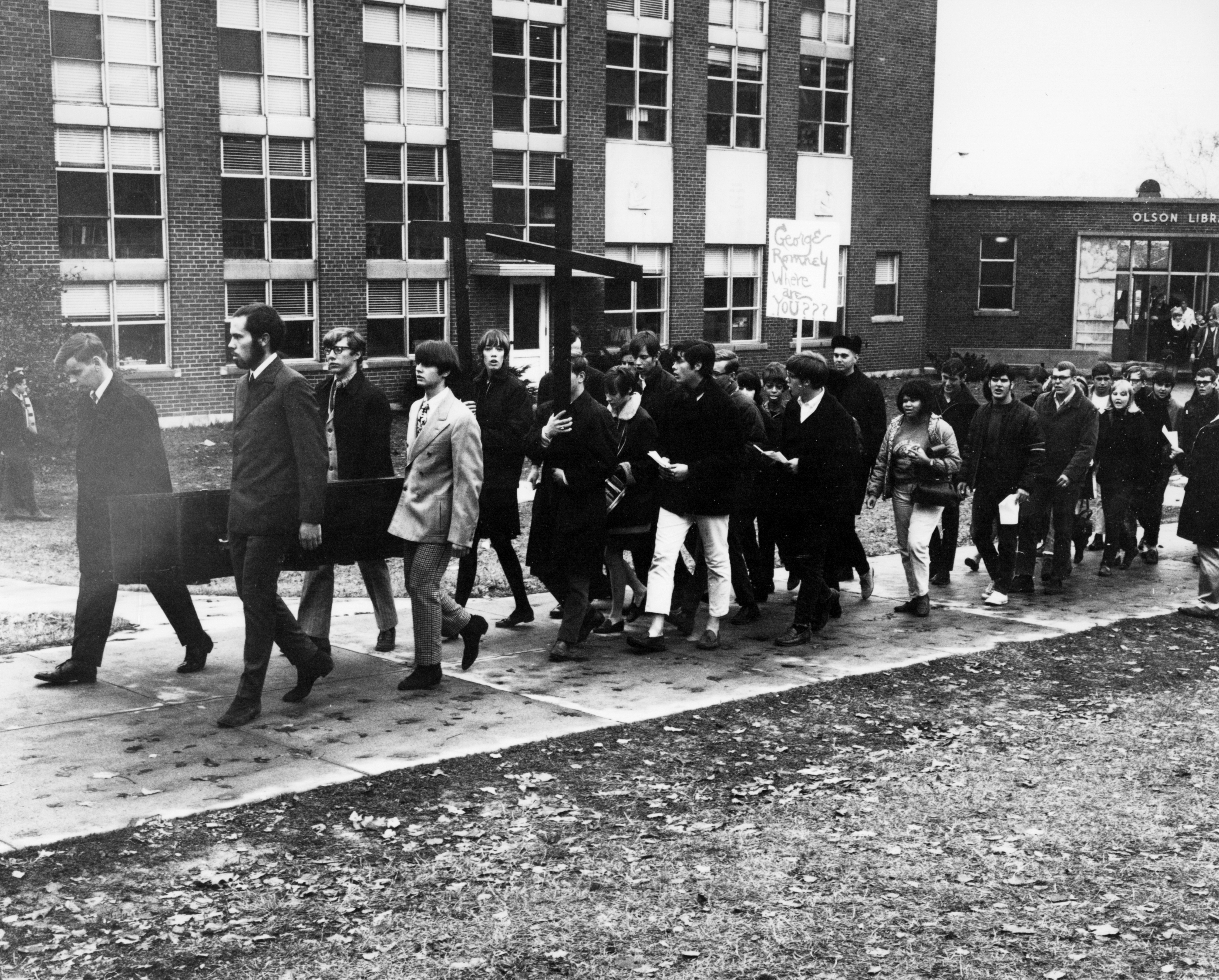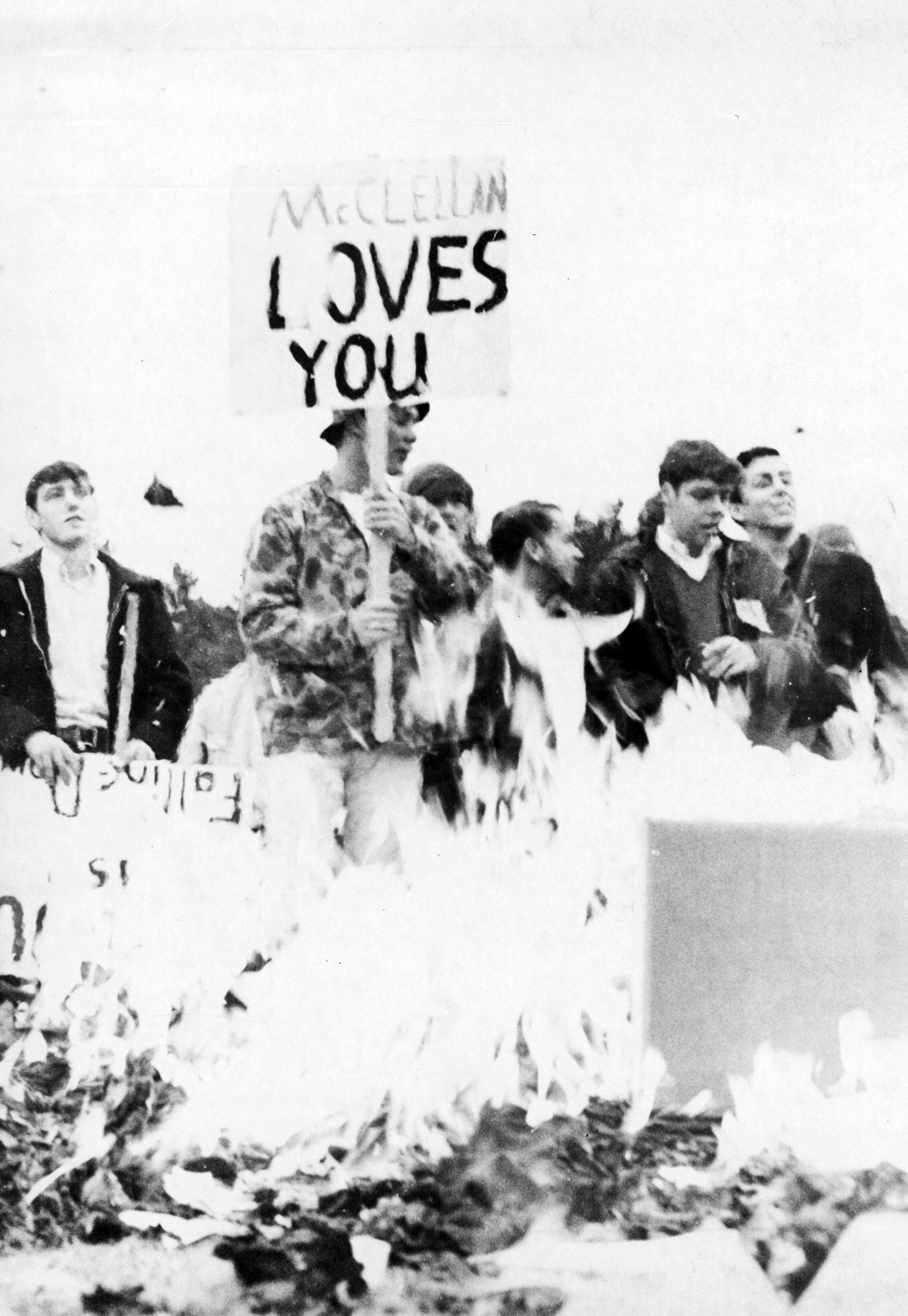The McClellan Controversy (Continued)
The Significance of the Protests to the Students
In general, it seems that the students participating in the protests did not view themselves as Communists. Some did not even see themselves as members of the counterculture. Don Keskey wrote to the Northern News, “The students who have expressed their views on the McClellan case are NOT those who are ‘so disillusioned with the United States’ that they want ‘to destroy existing institutions.’ On the contrary, the students involved and those closest to the facts in the situation represent some of Northern’s finest students academically. These students are not the long-haired, draft-dodging, negativist-thinking people. They are loyal Americans, conscientious, constructive-minded, optimistic, and, most importantly, sincere.”
Many students also did not see the case as simply trying to bring back a well-liked teacher. Instead, they saw it as an assault on academic freedom in general and what the values of a university should be, and wanted to improve the university as a whole. They felt that they were acting responsibly and had only begun to protest when it was clear that there were no other avenues to effect change. One said that the protesters were “not anti- or against any institution. They [were] not trying to destroy. They [were] trying to create.”
Some proclaimed their sense of what the protests were about in editorials to the newspaper:
When McClellan and academic freedom go to court nothing less than civilization itself goes on trial…If our youth are ever stopped from looking for the truth—not allowed to look in all directions—civilization will die. Kill academic freedom and you kill man.
As [a previous] editorial has stated, a teacher ‘has a contractual responsibility to the taxpayers and to the community and to the university.’ These commitments do exist. But it is a commitment to develop free human beings who can pit their humanity against the subtle but awesome pressure of a society ever more prone to subtly manipulating its citizens. To accomplish this goal, a teacher must be free to bring his students into society and to fortify them against the forces of conformity. He must be free to teach them not to avoid social and institutional issues if for no other reasons than to preserve freedom of choice and the sanity of diversity of opinion…If the present trend continues, I fear NMU will graduate individuals useful as cadres for the system—unartistic squares, up-tight bores more concerned with status and personal security than with life and experience.
I didn’t come here to receive a piece of paper at the end of four years! I didn’t come here to have the legal right to stand in front of a classroom and talk! I came here to set in motion the forces of my dignity as a human being….There is no dignity in passivity; there is no validity or honor in unquestioned truth. This issue has thus become one of the deepest moral significance for we must tardily decide whether or not we want the educational experiences of the students at Northern Michigan University to be limited to the absorption of other men’s thoughts or to be dedicated to the building of a foundation on which new minds can construct and evaluate new thoughts.
Students might have also seen their protest as opposing powers in the community in general. In an interview, McClellan mentioned that older people in Marquette didn’t go against the university, Cliffs Dow, the hospital, or any other powerful group. Students appear to have seen their protests as going against some of these groups. They were particularly concerned with the fact that Ogden Johnson, the interim President, had been an employee at Cleveland Cliffs Iron Mining Company (CCI) and that, although he had been a high school superintendent, he had never been involved in higher education before becoming the President of NMU. Some of the signs at the protests read, “Johnson has never seen a Kaye Hall classroom” and “There was thinking before Cleveland Cliffs.” Some also objected to what they felt was biased reporting in the Mining Journal, which was owned by the Panax Corporation run by John McGoff, the head of NMU’s Board of Control. (Not so coincidentally, Dr. Harden was also a director of the Panax Corporation.)
Of course, not all students participated in the protests and the boycott because of their deep concern for academic freedom and the ideal of what a university should be. One student wrote to the Northern News:
I would like to briefly commend those students who whole-heartedly participated in last week’s demonstrations. I regret to say that I was one of the many who took advantage of the boycott and used it as an excuse to go home, sleep in, catch up on my washing and just mess around. I occasionally snickered at the protesters and got a good laugh out of some of the stunts pulled. I attended the mass meetings because there was nothing else to do and I thoroughly enjoyed the dances. It never occurred to me that there were some people really interested in the welfare of the school. They were not aiming for a week long party, but instead they cared about education, justice, the future of NMU and the effect on its students…You were laughed at, mocked, and cut down but still you marched because you knew what you were and are standing for. You people who are concerned will have to try and understand my kind of people who don’t care. All we want is our diploma and it doesn’t matter how we get it.
An End to Protesting but a Continuation of Student (and Faculty) Action
Students heeded Don Keskey’s call for an end to all protesting after McClellan Week in order to demonstrate that they were serious students whose only aim was to ensure academic freedom at Northern. Although no more protests occurred on Northern’s campus, students and faculty did take formal actions. The Student Government Association passed a censure resolution against Harden, Johnson, and the Board of Control. They also passed a resolution asking Michigan Governor George Romney to appoint a committee of “Recognized Scholars” to investigate the “Academic Freedom situation.” Governor Romney replied that he could do nothing because he considered the Board autonomous, even though the State of Michigan’s legislative appropriations committee had threatened to shut down Northern if it didn’t find a way to stop students and faculty from boycotting.
Donations began to come in for the CDAF as people realized that McClellan’s only recourse might be through the courts. Soon they had over $2000 raised for any legal costs that might be necessary for the McClellan case. Much of the money came from faculty, students, and community members, although the Michigan AAUP also donated funds. The Democratic Party of Michigan also donated money to the CDAF, leading to community uproar because they felt that the issue should remain a non-partisan affair.
In December, the Student Government Association voted to donate $500 of its funds to the CDAF to help the McClellan court case. Dean Lowell Kafer, however, refused to release the money because he could not “philosophically justify authorizing the expenditure of university funds to take court action against the university.” In response, the SGA voted to give Rob Fure $300 for his work on the Student Faculty Guide (a book of student ratings of professors) with the understanding that he would then donate that money to the CDAF. Kafer again refused this expenditure, though he did offer to work with the SGA to create a more autonomous funding system that would not go through an administration member. Keskey called this “an unethical tactic to emasculate a student representative body whose responsibility it is to work on behalf of the student body.” A week later, Fure donated one of his scholarships to the fund “on the part of the Northern student government which refuses to be intimidated or be subservient to the student personnel office, the business office, or the Board of Control.” The Northern News criticized the “negativity” of the Senate, who didn’t attempt to work with Kafer on the funding problem and instead took the “politically amateurish” decision to threaten resigning en masse or canceling All Events week.
As the next semester began with no re-instatement of McClellan, the ACLU began to plan serious court action. They urged that all of the faculty should put their names on the suit so that the case would clearly be about academic freedom rather than personal disagreements between McClellan and Harden. In February, 140 faculty members announced that they would file with McClellan as joint complainants, and ACLU attorneys formally announced that they planned to represent him. In response, the Board also terminated the joint administration-faculty committee that was supposed to investigate the McClellan case further before the court case occurred. The administration’s attorneys then released a statement that the signatures of so many faculty members indicated that there was a great deal of academic freedom at NMU because “It is a rare situation where employees can act with such freedom and indeed such lack of knowledge of the true facts with the consent and approval of their employers.”
In March, the SGA announced their intention to also become co-plaintiffs in the suit because they were “concerned about the impact…on the future of the university…[and] the free academic climate” of NMU. At first, it was unclear whether the SGA was an official organization with the right to sue anyone, but it was eventually determined that they could take part in the suit. On March 22, McClellan, 136 University faculty, and the SGA officially filed suit against Harden, Johnson, and the Board of Control. The official trial would not start for several months, and McClellan did not know how much longer he could hold out before committing to another job for the next year. But, if McClellan took another job, the ACLU believed that his case did not have a chance. So, the NMU AAUP began to raise pledges for contributions to McClellan’s next year’s salary should he not be reinstated before that time. McClellan promised that if he stayed without a formal job the next year, he would “make a substantial contribution to the intellectual life of the community.” They managed to raise over $6800 from primarily faculty contributions.
As this was going on, the administration ran an ad in the Mining Journal that simply read “Northern Michigan University has a long tradition of Academic Freedom” with a long list of names appended. Scrutiny showed that only twenty-five percent of the signatures were from active faculty members, and most of them were administration members who “who [had] more pressure on them to conform to the grandiose and pretentious and largely imaginative aspirations of the university.”
In May, as the court case was about to commence, Don Keskey and Rob Fure, leaders of the SGA, decided to insert information about the McClellan case and a request for funds to support the court case into letters being mailed to parents about Parents’ Day in order to save money on a separate mailing which they thought the university wouldn’t pay for. (see “Student Govt Memo to Parents” for the insert itself) They didn’t inform the rest of the SGA or the chairman of the Parents’ Day planning, leading to a great deal of uproar. Many parents contacted the university and indicated their disapproval of the insert. Keskey and Fure responded that since the SGA planned Parents’ Day, they thought that it would be alright to add the insert.
